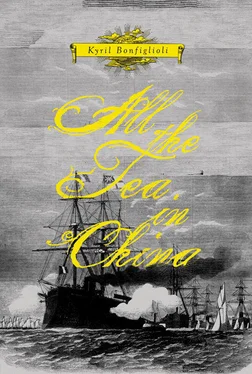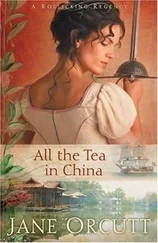While we trudged at the maddeningly slow oxen-speed through giraffe country one of the skilled huntsmen in the trek would set out each Friday and kill a giraffe. This great, improbable beast would be skinned and the Kaffir “boys” would cut his hide, with infinite care, into one or perhaps two enormously long strips. On the Saturday all would fall to and grease this strip with the tallow from the creature’s kidneys and guts. On the Sabbath, when all who had the slightest hope of salvation rested and would do no more than eat and journey no further than nature and decency demanded, the Hottentots would loop and sling the riem , as it was called, over the high branch of a tree and, having attached a heavy stone to the lower ends, twist and re-twist it until it became a stout and resilient rope. This took quite twenty hours and the “boys” became lazy, lazy, for they knew, intuitively, that no one would beat them on the Sabbath and to their untutored minds the Monday, when they could and certainly would be beaten, seemed infinitely far away. They were a cheery lot, with no memory of the past and no care for the morrow, but I did not envy them.
This beast, the giraffe, illustrates again the certainty of the Afrikaaners about the definitive nature of the Bible. There is no beast of that name in that Book so, clearly, it must be a camel — and kameel is what it was called. In the same way, the leopard was a tijger — what else could it be? One peculiarly ugly kind of antelope defied Biblical nomenclature, but the Reformed Church were not long at a loss: they called it the “wild animal”: wildebeeste. I was proud to share Dutch blood with these people; their pig-headedness exceeded that of the English by far.
Inch by inch, day by day, the landscape changed: flat-topped trees gave way to scrub, earth became sand and sand soon became stones, then rocks; for days we might march towards a distant mountain which seemed but a few miles distant, then for days we might crunch through grass taller than a horseman’s head, correcting our course at night when the stars came out. Some of us died, of course: snakes and crocodiles, buffalo and sickness all took their toll but my own little party were spared except for Orace, whose loss I think I have already mentioned, and my horse. He had been sold to me as “salted” — that is to say, he was supposed to have survived the fever which kills horses in Africa. This was not true. As soon as we entered the area where horses die, he died. I quarrelled bitterly with the smouse because he had introduced me to the horse-coper who had sold and vouched for the animal and I knew he must have drawn a commission but he would not part with a stiver as recompense. He was a bad Jew; he treated me as though I were a Gentile. “This is no way to conduct business,” are the words I spoke to him from a full heart. He pretended to care nothing for them, but such words, spoken by a full-blooded Jew of the Sephardim to a mere son of the sons of Gomer is a terrible rebuke, terrible.
The next day, at the mid-day meal, he approached me in an ingratiating way and offered to sell me a riding-mule at cost-price. My buttocks were bruised blue (I speak from hearsay, of course) from riding on the tailgate of the wagon but I affected to ignore the smouse ’s existence. “See, Blanche,” I said, pointing at the sky, “a kite or vulture!”
“They call it an aasvogel here,” she replied, smiling. I was not pleased with her. From women one wishes loyalty, not information.

Since I penned those last few words I have been thinking. Dozing a little, too, but also thinking. My difficulty is that this next episode, as well as being unpleasant, involves a matter to which the Statute of Limitations does not apply — I refer, of course, to murder — and also involves certain people with whose descendants I have a pleasant and profitable trade relationship.
I think that if I mention the name of the smouse , which was Oppenheimer, any of you who may inherit shares in this House will realise that it is in no one’s interest to bruit the incident abroad. As to the other matter, that of the Statute of Limitations, I fear I can only surmount the difficulty by, for once, paltering with the truth a little. You may therefore treat the ensuing few folios as, in some sort, mere fiction.
The cruel sun, glaring blindingly down on human beings threading their weary way across South-Western Africa, takes its toll from each one in a different way. Members of the Reformed Church become confirmed in their belief that the world is flat; women spend most of their day in bed and yet spurn their husbands’ attentions; little children grow old and wise overnight. The effect on me was that I dwelled more and more on the smouse ’s perfidy in the matter of the horse until hatred filled and darkened my whole mind. Each time I set eyes on his accursed riding-mule I trembled with irrational rage. The smouse ’s sickness from the sun took a curiously opposite form: he became obsessed with the notion that I hated him, and whispered to all who would listen that I had threatened his life. This was a monstrous mis-reading of my character, for I was then the mildest of men and had killed no more than six or perhaps seven men in my whole life — and always in self-defence, as I have related.
Silly though these phantasies were, they nevertheless poisoned our lives and many a curious glance was cast at both of us, especially when the smouse had occasion to go to our — his — wagon for supplies or fresh linen. I watched him narrowly on these occasions, for I believed, by then, that he was capable of everything base. I received the impression that, while I watched him, the men of the trek were watching me.
One day it fell to the men of our wagon — the smouse and me — to go out and shoot for the communal pot; it was the custom for each wagon to take its turn at this. I was bidden to ride eastward (on a borrowed horse), the smouse was to go west. Neither of us was skilled in the traversing of wild country and I suppose both of us must have unwittingly circled towards the north. After riding several miles without sighting any game, I tethered my horse just below the crest of a ridge and crept to the top, hoping that there might be a fertile valley, rich in game, on the other side. To my fury, all that was to be seen was that accursed riding-mule of the smouse , tied to a thorn-tree a bare hundred yards away.
With a chuckle which rang crazily even on my own ears, I levelled my rifle at the brute’s hindquarters, confident that I could graze its backside enough to lame it without crippling. I cannot tell whether the sweat ran into my eyes or the heat-haze distorted my vision or whether some madness possessed me; all I can say is that, as I squeezed the trigger, the hated beast dropped dead, a bullet through its heart.
Something snapped in my brain: in a flash I saw what childish petulance had been inflaming my brain for days — and what a criminally stupid and unworthy thing I had now done. As the smouse ’s head rose above the bush where he had been “still-hunting” I jumped to my feet, waving my gun and shouting, running towards him, longing to apologise and to repair our friendship.
Poor, craven fool, he quite misconstrued my actions; he fired both barrels wildly in my direction, threw away his gun and took to his heels as though the devil was after him. It was idle to pursue — he ran as fleetly as any bok.
I remounted and rode on sadly, taking little notice of my direction. Fortunately, I fell in with game: covey after covey of fat, mindless birds resembling guinea-fowls and a nice little gemsbok. The westering sun startled me: I realised that the laager was now to my south-east. Soon I walked my laden horse in through the thorn zareba — having approached from the direction in which the smouse had left.
Читать дальше













